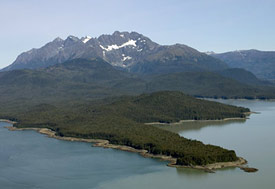Waste from gold and other kinds of mining pollutes the planet. Miners often use arsenic, a toxic metal, to leach gold from rock, creating a nasty slurry that contaminates drinking water and kills wildlife when it’s released into the environment.
Anyone who thinks dousing our waterways or landscapes with such toxic pollution deserves to have his or her head examined — even if that head is perched on the neck of a Supreme Court Justice.
In a ruling decried by environmentalists, public health officials, and fishermen in Alaska, the Court voted 6-3 
The Supreme Court didn’t just say this was okay. In an Orwellian analysis, they actually ruled that the Clean Water Act — legislation designed to keep our waterways clean and the wildlife that lives in them safe — instead permits just the opposite. It boggles the mind – well my mind, anyway. Evidently not the minds of the six Justices who supported this opinion.
Notably, the Supreme Court’s decision reverses a May 2007 ruling by the 9th Circuit Court of Appeals, which found the mining company’s permit in clear violation of the Clean Water Act.
“If a mining company can turn Lower Slate Lake in Alaska into a lifeless waste dump, other polluters with solids in their wastewater can potentially do the same to any water body in America,” said Trip Van Noppen, president of the nonprofit environmental law firm Earthjustice, which brought the suit.
“The good news is that the problem is reversible. It was caused by a Bush administration rule reversing thirty years of successful regulation under the Clean Water Act. We call on President Obama to act immediately to repeal this rule.”
“The purpose of the Clean Water Act is to keep America’s waters safe for drinking, fishing, and swimming,” added Tom Waldo of Earthjustice, who argued the case on behalf of three conservation groups. “The Clean Water Act was intended to halt the practice of using lakes, rivers, and streams as waste dumps. Today’s decision does not achieve these purposes.”
What’s the magnitude of this decision? Coeur d’Alene Mines Corporation’s Kensington gold mine near Juneau is now permitted to pump over 200,000 gallons per day of a toxic wastewater slurry directly into Lower Slate Lake in the Tongass National Forest. The dumping, which will take place over ten years, will eventually deposit 4.5 million tons of solids in the lake, killing nearly all its aquatic life.
Earth Justice said this rule change can be reversed with a new rule issued by the Corps and EPA, by legislation, or by revising the informal EPA memo. A bill already introduced in this Congress by Representatives Frank Pallone (D-NJ) and Dave Reichert (R-WA) would, if passed, accomplish this task. The Clean Water Protection Act, H.R. 1310, has 151 cosponsors.
Contact Earth Justice to find out how you can help.












1 thought on “What impact does mining have on the environment? Duhhh…”
Kate, yes there is a lot of water pollution, but of course, the mining companies don’t want you to know that!
Comments are closed.